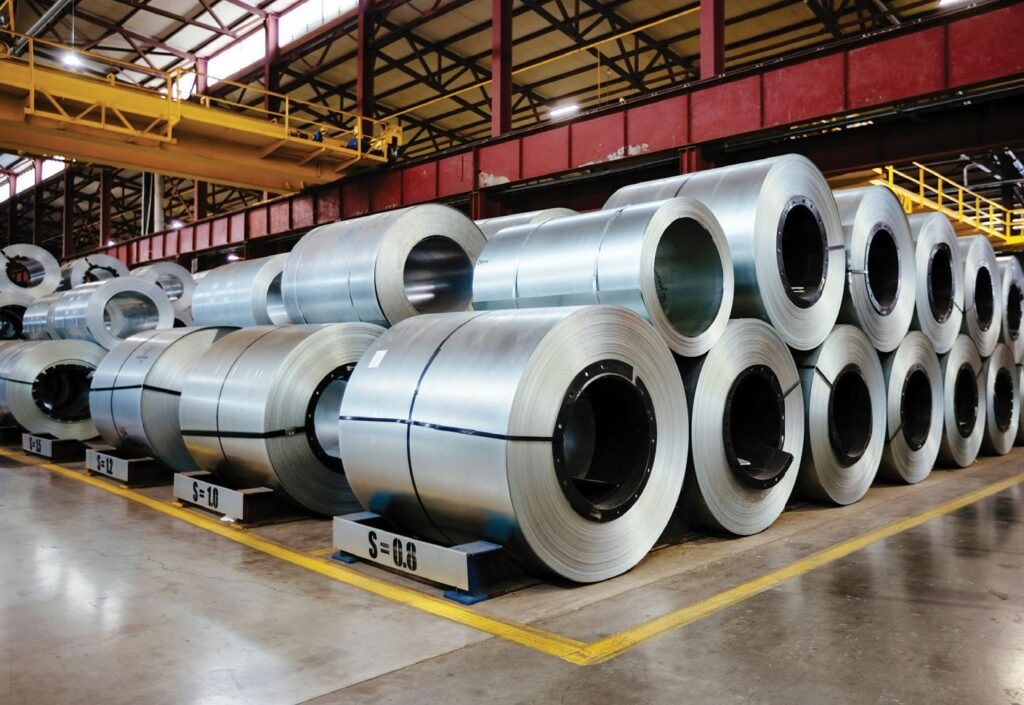Recent Posts
Steel Consumption in India Projected to Grow 9–10%: Steel Secretary
September 25, 2025Steel Quality Control Order Unfair to MSMEs, Distorts Market: GTRI

The recently issued Quality Control Order (QCO) on steel imports is unfairly hitting India’s micro, small and medium enterprises (MSMEs) while creating room for price manipulation and favouring large players, according to a report by the Global Trade Research Initiative (GTRI).
The QCO, enforced by the Steel Ministry on June 13, mandates Bureau of Indian Standards (BIS) certification for imported raw materials. GTRI argues this has severely disrupted supply chains for MSMEs in key sectors such as auto components, construction, and precision engineering. Many firms are facing delays, demurrage charges, and even cancelled export orders due to the new compliance requirements.
GTRI’s report flagged that hours after the QCO was issued, a major stainless steel maker in India raised prices significantly—allegedly having secured BIS clearance for its overseas suppliers in advance, giving it a head start over competitors. Meanwhile, the Steel Import Monitoring System (SIMS) portal continues to demand BIS certificate details despite a July 17 interim stay by the Madras High Court.
The Steel Ministry has defended the QCO, saying it levels the playing field and prevents the dumping of substandard steel. The Ministry has now approached the Supreme Court to lift the HC’s stay.
Calling the QCO “duplicative, impractical, and harmful to trade,” GTRI said similar checks are already performed under the BIS Foreign Manufacturer Certification Scheme (FMCS). It warned the move could be seen as a non-tariff barrier under WTO rules.
“The real value of certification lies in the final product, not in every raw material stage,” the report noted. Major economies like the US, EU, and Japan don’t require separate certifications for inputs if the final product meets standards.
GTRI also highlighted a distortion in the market, pointing out that finished products like welded pipes are exempt from the order, potentially encouraging imports of higher-value goods over domestic production.
The think tank has urged the government to suspend the QCO, hold consultations with stakeholders, exempt inputs certified under FMCS, and provide a 90-day transition window for future rule changes.
However, Steel Authority of India (SAIL) officials denied any QCO-linked price hike. “Our prices are reviewed monthly based on production cost,” said Salem plant Executive Director P.K. Sarkar.
- Auto Components Industry
- BIS certification
- Buildwatchnews
- Construction Raw Material
- Demurrage Charges
- FMCS BIS
- GTRI
- India MSME Policy
- Indian Manufacturing
- Indian steel imports
- MSMEs
- Precision Engineering
- QCO India 2024
- Quality Standards BIS
- SAIL QCO Response
- Salem Steel Plant
- SIMS Portal India
- stainless steel prices
- Steel Authority of India
- steel ministry India
- Steel Quality Control Order
- Steel Regulatory Compliance
- steel supply chain
- trade policy India
- Welded Pipes Import
- WTO Non-Tariff Barrier
Recent Posts
Real Estate Investment Trusts Outshine Realty Stocks Amid Market Uncertainty
September 25, 2025Categories
- Airport3
- AP37
- Apartments32
- Bengaluru133
- Budget 202521
- Cement114
- Chennai323
- Construction603
- CREDAI30
- Editors Pick42
- Equipment27
- Events11
- GST13
- Highways77
- Hotel1
- Housing114
- Hyderabad43
- Industrial245
- Infrastructure368
- Interiors15
- Iron Ore22
- Karnataka39
- Kerala26
- Land72
- Market Updates207
- Metal29
- Metro89
- Mining20
- MSME11
- News1,529
- NHAI54
- Paints34
- Power Shutdown1
- Properties41
- Puducherry8
- Real Estate480
- Road173
- Sand22
- Short News117
- SIPCOT3
- Steel Daily343
- Stocks6
- Tamil Nadu300
- Technology40
- Telangana29
- TIDCO2
- Trade5
- Trending News1,083
- Video2
- warehouse1
Related Articles
Real Estate Investment Trusts Outshine Realty Stocks Amid Market Uncertainty
Real Estate Investment Trusts (REITs) outperform listed developer stocks like Oberoi Realty,...
BySamrita JosephSeptember 25, 2025Planned Power Suspension in Chennai on September 26: Which Areas Are Affected & What You Need to Know
Several parts of Chennai will face a planned power shutdown on Friday,...
BySamrita JosephSeptember 25, 2025TN Launches Rs 45.21 Crore Upskilling Programme for 50,000 Construction Workers
Tamil Nadu has launched a Rs 45.21 crore upskilling programme for 50,000...
BySamrita JosephSeptember 25, 2025Crown Worldwide Group Expands Indian Operations with Third Warehousing Facility in Bengaluru
Crown Worldwide Group has opened its third green-certified warehousing facility in Bengaluru,...
BySamrita JosephSeptember 25, 2025















Leave a comment